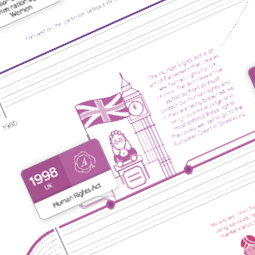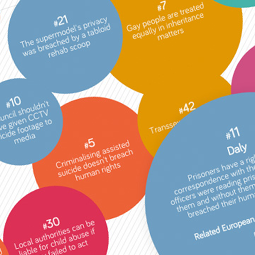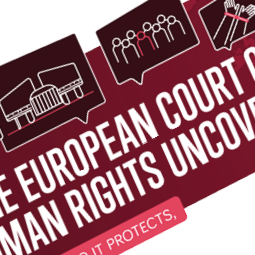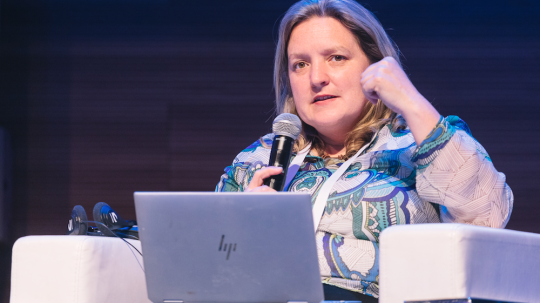
Emma: Hi, everyone. Today, I'm joined by Quinn McKew, Executive Director of Article 19. Welcome Quinn, how are you today?
Quinn: I'm doing really well. Thank you for having me.
Emma: So to get us started Quinn, can you tell us what you do in 15 words or less?
Quinn: Article 19 fights for all voices to be heard, regardless of their power in society.
Emma: So the work that Article 19 does upholds freedom of expression. And we're wondering what does freedom of expression mean personally to you?
Quinn: It's the ability to seek and impart information to be informed, to be able to kind of raise your voice against injustice, or just for common issues that are important to you.
Emma: Recently, there have been threats to freedom of expression in the UK and across the UK. So can you tell us a little bit about that?
Quinn: I've come from the United States, we've gone down a path for a number of years of fanning this idea of like a culture war, of trying to create the idea that there's a right way of thinking and a wrong way of thinking. And unfortunately, I'm seeing a lot of echoes of that in British society…we're seeing a more authoritarian-leaning government. So restrictions of the right to protest, restrictions of the right to speech, the idea of othering your opponents, not as opponents, but as bad people. All of that is incredibly worrying that we see overall.
Emma: So we found out a few weeks ago that the government will propose a Public Order Bill later this year. So what is the public order bill? And how will it affect people's freedom of speech in the UK?
Quinn: The Public Order Bill is another version of a bill that was previously struck down in the House of Lords. From our perspective, as a freedom of expression organisation, there are things in that that are fundamentally problematic to the idea of a pluralistic, democratic and open society... so there's things in there like banning protests if they get too noisy, and making it illegal for people to kind of chain themselves to buildings, or to obstruct people's access in certain ways, which are fundamental ways that people draw attention to injustice, by making things uncomfortable to people. That's the whole point of protest and demonstration and debate. They're supposed to draw attention to themselves. And the Public Order Bill effectively makes it illegal to do that. And then finally, and yet I think, most concerningly, it expands the ability and the ability of the police to stop and search individuals.
Emma: If you could immediately put right one injustice in the UK right now, what would it be and why?
Quinn: One of the fundamental justices that we're seeing in the United Kingdom right now is the attempt to minimise kind of racism and discrimination by telling people that didn't happen to you because that doesn't happen here in Britain. And it's gaslighting at like an epic level. And I think we need to be really careful that what that's doing is creating an environment where you're fundamentally silencing people about their own lives…
Emma: Which is the most important human right to you?
Quinn: Human rights, by their definition, are supposed to be universal and indivisible. People shouldn't have to choose between having food and being tortured. And so I do think it's really important to uphold that idea that there is no one right, that should necessarily be more important than the other. But the ability to dissent, to debate to call leaders into account, that is fundamentally an expressive act. And so I'd say for democracy, freedom of expression is the most important human right.
Emma: And at EachOther, we talk about the impact that lots of small actions can have. I'm wondering if you have any ideas about how to heal the divisions in society right now?
Quinn: A lot of the problems in the world are rooted in insecurity. And a lot of that insecurity can only be addressed by listening. You know, people who refuse to acknowledge others' lived existence, are perpetuating an injustice against them. And by pushing them away by saying that that's not happening, because they refuse to actually listen to their experiences, that just leads to this increasing cycle of insecurity, which leads to kind of different levels of violence and intimidation and response.
There's a lot that unites the United Kingdom, sense of fairness, a sense of justice, support for incredibly important institutions like the NHS, try and try and focus on those things where there's common ground to build from right now.
Emma: If you had one message to get across today, to anyone listening about the Public Order Bill, what would it be?
Quinn: Just to remind people that voices have power, voices have power when they speak, and they can also have power when they're silenced. So be sure you're using the right voice at the right time to get your view of society across the fight for what you believe in.
Quinn: Understand what's at stake and take action, reach out, fight, oppose.
Emma: Fantastic. Thank you. Quinn, thank you so much for joining us today.
Quinn: Thank you for having me. It's great to speak with you.




